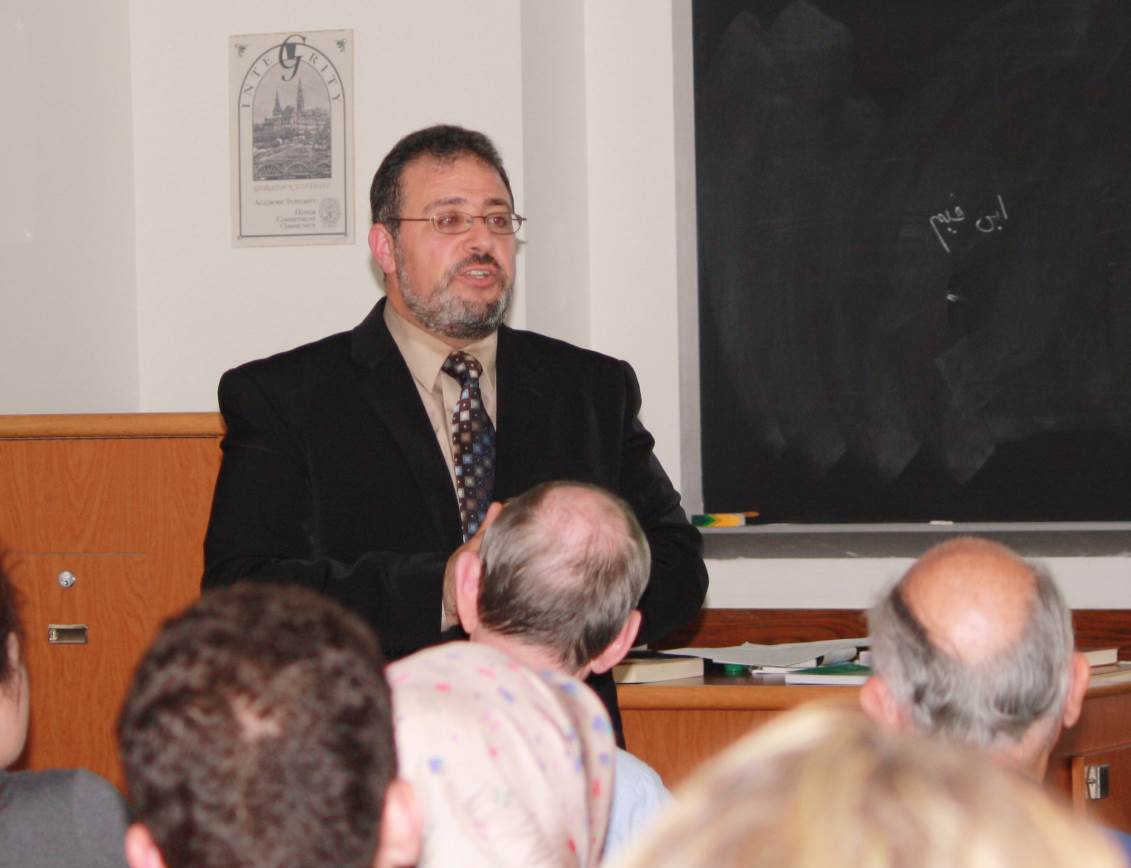"Why do you hate Shariah?" The question resonated across the lecture hall filled with more than a hundred students, alumni, professors as well as other attendees, in the historic White-Gravenor Hall. The topic was hot off the press: Shariah. The word has been maligned beyond recognition and one of the main reason for the Muslim Chaplaincy at Georgetown University to host a presentation was to set the record straight.
"Taliban, jihadist, the Shabab? That is all they know about Shariah!" said Imam Yahya Hendi, the popular Muslim Chaplain at the university who has spoken on Islam in over 63 countries. "Shariah is a set of paradigms, principles not "Islamic Law". these are two different terms. Fiqh is the law, the actual practices and moral concerns," clarified Hendi.
"If you ban Shariah, you ban our prayers five times a day, which is against the constitution. You cannot legislate against your own constitution," stressed Hendi, " Shariah is our aqeedah (creed), our Ibadah our worship, translating our theology into practice our living the sacred text, the scripture, shariah is Islam. Do you understand why this offends Muslims?"
To explain why the world does witness violence and an antithesis of Islamic texts in Muslim countries, the chaplain led the audience through a brief synopsis of the history of Islamic religious institutions for perspective. From the era of the Abbasid Khalifas, who encouraged critical thinking by rewarding writing or translating books with the weight of the book in gold, he took the audience to the destiny left by colonial powers, who destroyed the intellectual madarasah system in the Muslim world, where algebra, philosophy, science were taught along with language and religion. Women played an active part of these madrasahs.
"Colonialism forced seminaries to go underground, fueling a militarized educational movement, whose quest was to drive colonials out. Many teachers and shuyookh were killed, which created a vacuum, leading to a dearth of qualified teachers, so layman started examining scripture without knowledge. To future stagnate critical thought, scholarship lost independence that they sustained through endowments, when institutes of learning such the Al-Azhar were nationalized," he stressed. Today, he informed the audience, in many Muslim countries imams are government employees, paid by the government.
Emphasizing the need for Muslims to establish seminaries that encourage open engagement by giving them the environment to think freely, where politically independent ulema can discuss and ask questions, where scholars are not scared of being killed or demonized for differing from the rulers, Imam Hendi defended Islamic scholarship, "the gap is being filled, we are reconnecting with our traditions, openness and critical thinking but we have two hundred years of catch up."
He showed the audience several books by prominent Muslim scholars written in Arabic and read out from them. Names of chapters such as Community living, Independent Court System, Interest of People to enforce Justice shocked some in the audience who were expecting to hear about banning women's education and violent warfare.
The largely friendly audience asked questions on polygamy and whether women could be leaders and how the shariah deals with these issues. Elucidating that the sources of Shariah are the Quran and the Sunnah, followed by Ijma' (consensus), Qiyas (historical cases from Islamic Jurist), Imam Hendi also explained the concepts of urf or customary practice, isthisan and ijtihad as well as how scholars come to the conclusion whether some thing is allowable or not.
There were no outbursts or accusatory Islamophobic comments during the presentation. One individual asked why there was a sudden deluge of anti-shariah rhetoric in the past few years. Largely the listeners were there to learn and engage. Volunteers from the Georgetown Muslim Student Association helped serve a halal dinner.
Angela, an alumnus of Georgetown was attending from across the Potomac, she now resides in Alexandria, VA. "This is a timely topic, it is very important to be informed and imperative to know our faith, so we can practice Shariah." The session was very informative, a place where we can challenge our own views."
Karen Barnes, an ESL teacher from North Virginia was attending because she is interested in other cultures. " I am trying to understand Shariah. It gives me something to say to friends who are anti-shariah,' said Barnes.
Along with Georgetown University, the first American University to hire a full-time Muslim chaplain, Imam Hendi is also the Muslim Chaplain at the National Naval Medical Center in Bethesda, MD. Imam Hendi is a Public Policy Conflict Resolution Fellow of the Center for Dispute Resolution of the University of Maryland School of Law and the Maryland Judiciary's Mediation and Conflict Resolution Office.
Imam Hendi is the founder and the President of Clergy Beyond Borders, and the founder and the president of the newly founded organization, Imams for Universe, Dignity, Human Rights and Dialogue. A dynamic speaker he lectures all over the world on the topics of interfaith, domestic violence, Middle East conflict amongst others.
